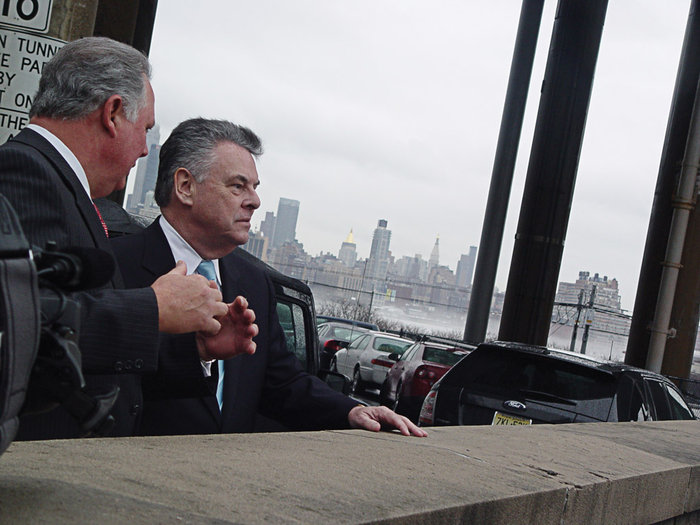Congressman Albio Sires (D-NJ) took Congressman and Chairman of the House Committee on Homeland Security Peter King (R-NY) on a tour Friday morning of four of the nation’s most high-risk terrorist target sites along what the New York Times called “the two most dangerous miles in the United States” in Hudson County.
Federal homeland security funding has been cut by two thirds over the past two years, and will be cut further over coming years, King said.
Jersey City has five of the tallest buildings in the state.
____________
-The Holland Tunnel,
-The PATH station at Exchange Place in Jersey City (across from New York City’s financial district),
-The Port of Newark in Elizabeth, and
-The Lincoln Tunnel, where they held a press conference.
New York and New Jersey are the number one terrorist targets in the world, King said.
“The war is ongoing,” he continued, “and the threat is as real as it was on Sept. 10,” in reference to the day before the terrorist attack on the World Trade Center in 2001.
Local perspectives
Mayor Turner said, “Congressman Sires invites the chairman and officials to the area from time to time so they can have a personal experience of what it takes to provide for security in this heavy-trafficked area.”
The Lincoln Tunnel lies in Weehawken and sees a large volume of commuters and cargo pass through every day.
“We’re not just a residential and employment hub, but we are also a transportation hub,” Healy said of Jersey City. “We’re home to the Holland tunnel, four PATH stops, four ferry stops, a light rail system that connects our entire city, as well as bus transportation which many of our residents rely upon.”
He added that the city has the five tallest building in the state, making them a further potential target.
Keeping up with anti-terrorist technology
Both congressmen emphasized the importance – and high expense – of keeping up with the latest anti-terrorist technology such as security cameras, lasers, radiation testing, and the training required to run and maintain it.
Because of the many tunnels, bridges, and landmarks in the two states, total coordination between officials and multiple methods of defense is necessary.
“Ports and tunnels are such an inviting target,” Sires said.
“There is no silver bullet,” King stated. “There is no guy with a sign around his neck saying he’s going to blow up a tunnel or a bridge.”
One of the most impressive defensive technologies currently in place, Sires said, was the set of 100 invisible lasers he saw aimed at the platform at the PATH tunnel. The beams detect when someone steps on or off the platform.
The problem with budget cuts
“Security is light years from what it was during 9/11,” King said, but added that complacency at this point would be a dangerous risk.
He believes the terrorist threat is even more serious now because terrorist groups may try and seek out residents in the area instead of non-citizens to attack from within.
The two congressmen reported that communication between officials in all four locations was good, but must be consistently improved.
“We’re being penalized for our success,” King said. “[Washington] think[s] the threat is gone.”
Sires said that with the tremendous growth particular to both the New York City and New Jersey’s Hudson County communities, it would be unwise to cut resources. He said that by 2035, the amount of goods and people crossing through local ports are expected to double.
Gennarose Pope may be reached at gpope@hudsonreporter.com
